January 8
When the Kipharts began building wells in Ghana a dozen years ago, their principal contact was Peter Eduful, a Ghanaian who they had met through a mutual friend when Peter spent some time at the University of Chicago. Peter handled all logistics, contacts and finances for the Kipharts, eventually leaving his government job to work full time for the Kipharts. He was kind, deeply religious, competent and totally trustworthy. When Peter died suddenly, at 62, of a heart attack two years ago, it threw a complete monkey wrench into the Kipharts Ghanaian plans, and they began searching for a way to continue to operate. Feuds erupted between members of Peter’s family, some of whom he had employed, with the Kiphart’s knowledge, who thought they were “entitled” to assume Peter’s work. Not wanting to get in the middle of this feud and unsure that any family member had the skills to do the job, the Kipharts thought they would need to look elsewhere.
With the Olopades suggestion, we interviewed Peter’s son, Alex, a very bright young man with an architectural degree from Harvard. I was highly skeptical, not because he didn’t have the skills, but because I was uncertain he’d make the necessary commitment, with all the other things he has on his plate. Happily, I was dead wrong and, with Sola’s guidance and mentoring, Alex has produced several reports documenting the status of the 70 or so wells, conducting needs assessment interviews and making recommendations. We’ll be going with Alex and his partner in this effort, Frank, to visit a number of these wells today. (Last night at dinner we saw photos of Alex’s new twins.). This is a very happy and heartwarming ending to the story that began with Peter’s unfortunate premature death.
After breakfast at the Inn, we drive over two hours to Bonkwaso, the first stop of the exceedingly ambitious agenda Alex has set for us today. Traffic is heavy and the air quality terrible, aggravated by the dust because of the dry season. Once we get off the main road, travel is bone jarring and the dust from the dirt road so thick that we need to maintain a big distance from the other vehicles in our group. Several of us, including moi, have developed persistent coughs.
Rather than try to describe each place we stopped in detail, I’m going to give you the overall picture as best I can. The Kipharts, through the Olopades and the Center for Global Health at the University of Chicago, have embarked in the last couple years on trying to partner with villages, generally through their chiefs, and with governmental units (districts) so the the villages and government are sharing responsibility for water, sanitation and health rather than merely accepting gifts from the Kipharts. This is not an easy transition to effect, since the villages understandably liked getting unfettered gifts and districts were not averse to having their obligations performed for them.
The Kipharts decided to try to set up two model projects in the same district, Bonkwaso and Abasua, and those were the first two places we visited and the spots we spent most time at. In the first, the chief was resisting the new plan strongly, but Sola minced no words in letting him know definitively the way things were going to operate. My guess is that this chief is going to get it very quickly–he’s quite smart–and will operate well under the new rules. The second chief definitely gets it already. In both places, a representative of the district, with whom Alex had been in touch was present, and this was very helpful in conveying the message. After this meeting we had a terrific us scheduled meeting with the head of the district, who could not have been clearer in his understanding of, and support for, the new approach, saying, “Of course, if we do not do things for ourselves, how can we expect that you will do them for us?” These three meetings were enormously encouraging, and signaled a major change in operations achieved in a very short period of time, thanks largely to the Olopades and the excellent work that Alex Eduful has done.
We visited three more villages, involving substantial drives over bumpy, dusty roads. In each, we saw a well in operation, were greeted by chiefs and elders, had our, hands shaken repeatedly, told, “you are welcome, akwaaba,” exchanged speeches and saw adorable children. We go through a ritual of being asked, “what is your mission” and replying as to why we have come. Though I’m not making this sound so appealing, it actually is very interesting and great fun. I took many photos, a sample of which I include below, including members of our team, chiefs, children ( for which I’m a complete sucker) and a final photo showing a typically religious name for a retail establishment.
 Alex 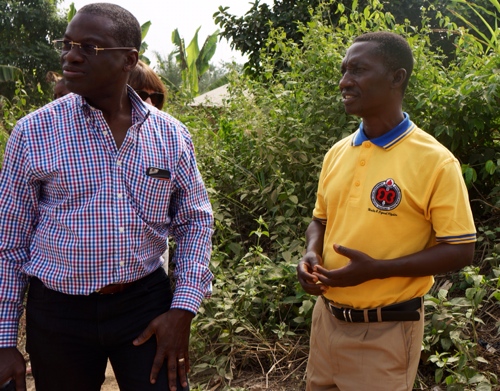 Sola and Jonathan, from the water district 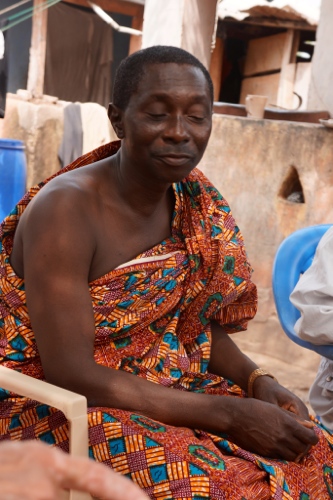 Abasua Chief 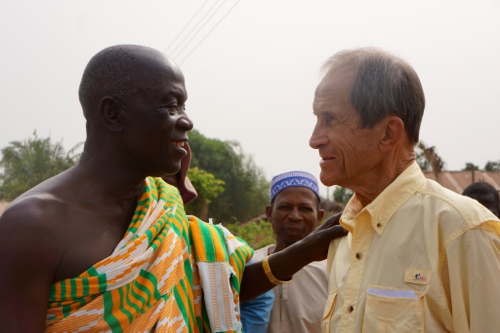 Dick and Chief 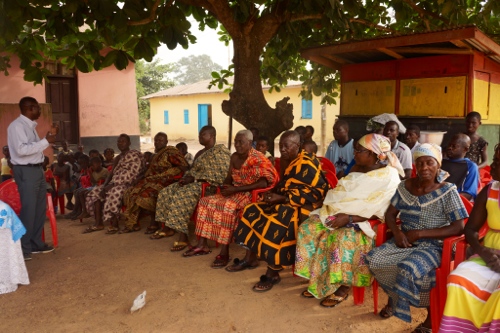
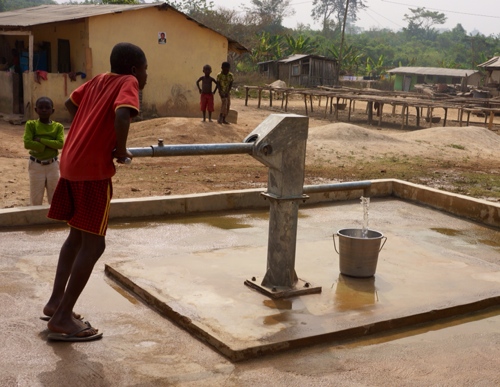
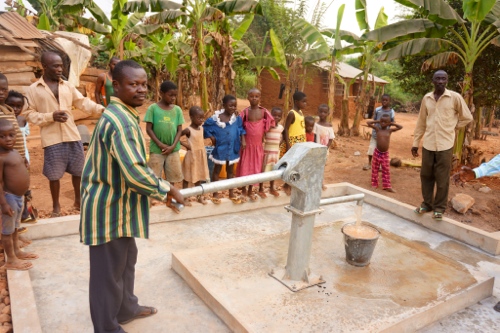
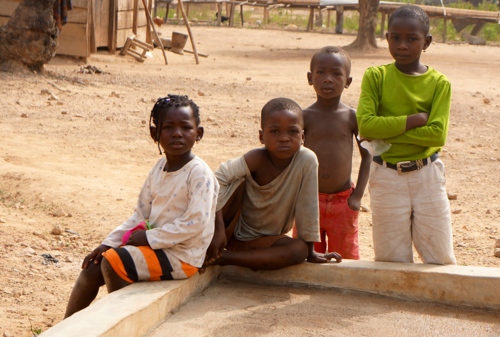
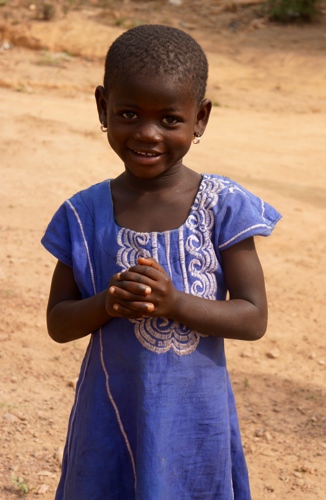
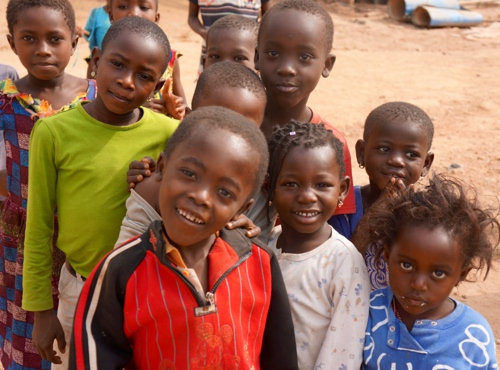
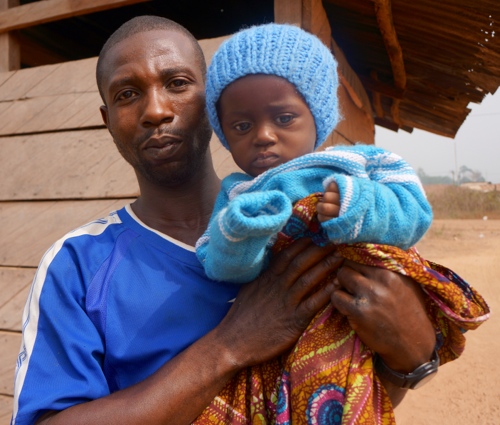
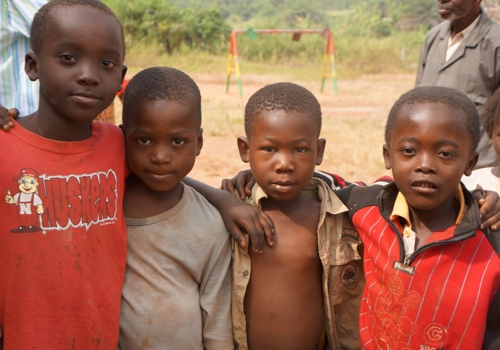
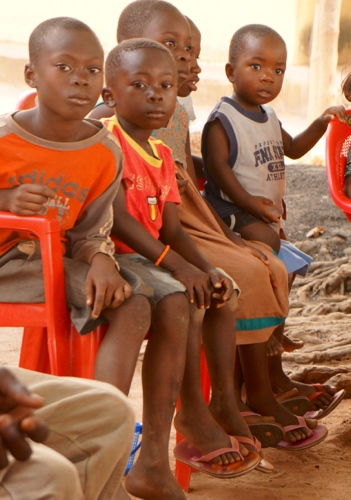
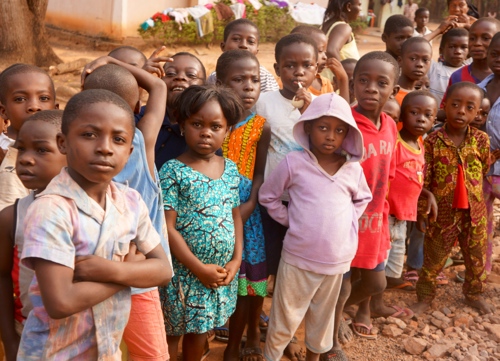
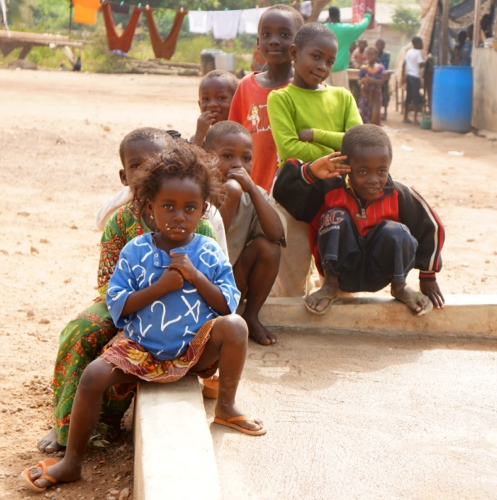
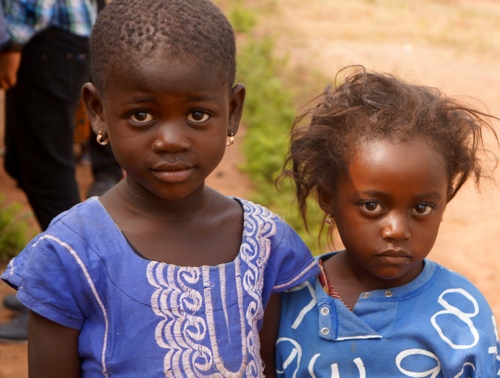
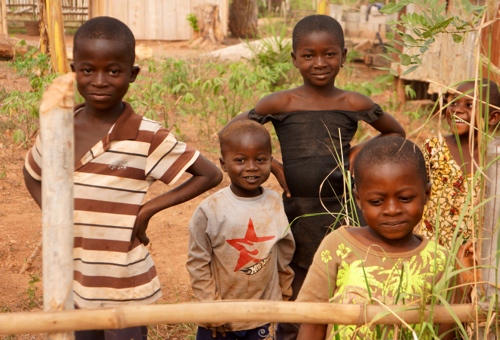
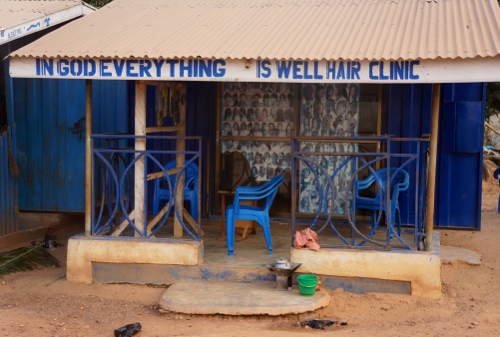
Okay, so I went a little overboard with the kids.
We drove back to the Inn, tired, dusty and badly in need of a shower. Half an hour later, we were off to a dinner attended by about twenty people, including all the people I’ve mentioned in this blog and five or six others who we’ve met on prior trips, including Dr. Annie and her doctor/son Robert, Alex Awesua, who has helped with the wells since Peter Eduful was involved, Dr. Ansong (of whom more tomorrow) and Phillip a terrific, young school headmaster. Everyone introduced himself and said a few words, which contributed to a very warm, family atmosphere in which everyone was genuinely glad to see one another.
Afterwards, we drove back to the Inn. The Kipharts, Olopades and Kanters spent half an hour or more debriefing the day and discussing future plans, as is our practice on these trips. Retired, with plans to awaken early for our last day.
January 7
Breakfast at the hotel with Kipharts, Olopades and Joe and Daniel Kwarteng evolves into an interesting discussion of challenges for pineapple farm and potential solutions. A good deal of the discussion revolves around difficulties in finding a sufficient number of people willing to do the very hard, grueling work. This stems in part from the disfavor young people hold agriculture in. It lacks the pizzaz of other fields and does not hold the promise of big rewards quickly. The best worker on the farm is a deaf man who graduated from The Cape Coast School for the Deaf, an institution that Joe Kwarteng and his wife, Ida, and the Kipharts have supported and which we have visited several times. They plan to actively recruit more deaf graduates. It’s also clear from their experience that women are more willing workers than men. Most of the women have young children, many more than one, so child care is an issue.
We set out with the Kipharts and Olopades on the short drive to he pineapple farm, which is a private for-profit venture of Dick and Joe Kwarteng, the former Dean of Agriculture at Cape Coast University. Begun about three years ago, the farm consists of several plots totaling about 2000 acres, of which around 450 are currently planted. The vast majority of the land is planted in pineapples, but recently they have devoted smaller plots to trying mangos and limes.
It’s always fun to visit the farm and see the progress that has been made. The large pineapple fields are quite beautiful, spread across hills and lower lands. We drive around to observe and hear about the plantings and meet some of the workers.

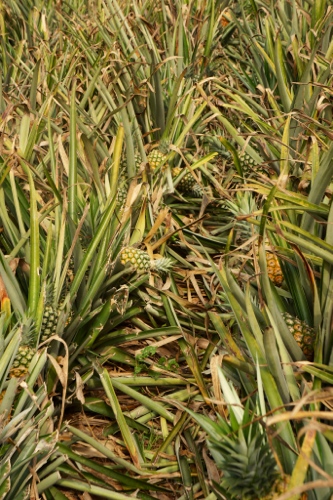
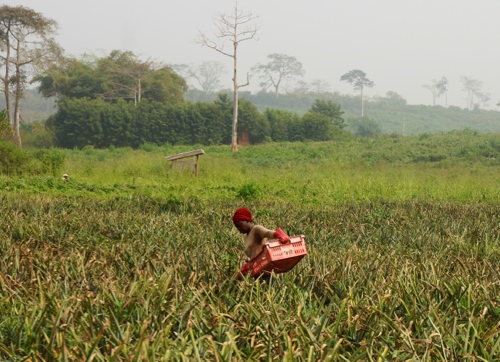
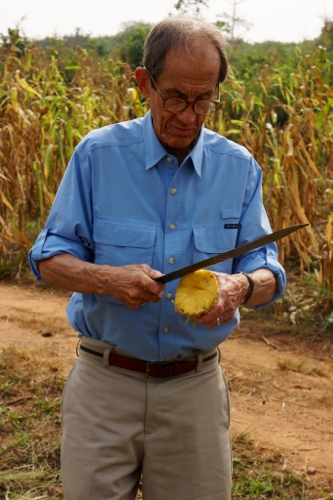 Dick cutting pineapple 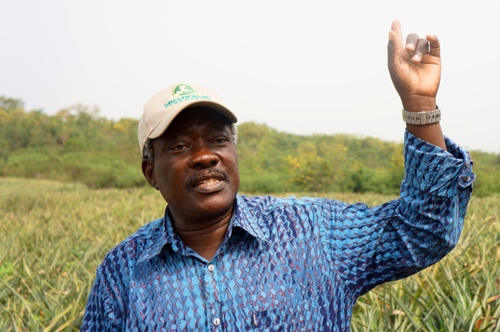 Joe Kwarteng 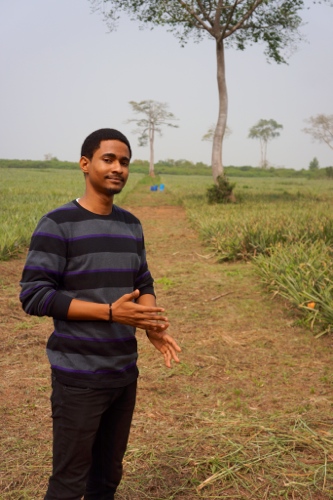 Daniel Kwarteng 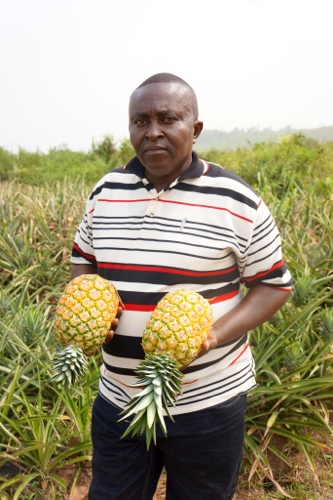 John, Field Manager 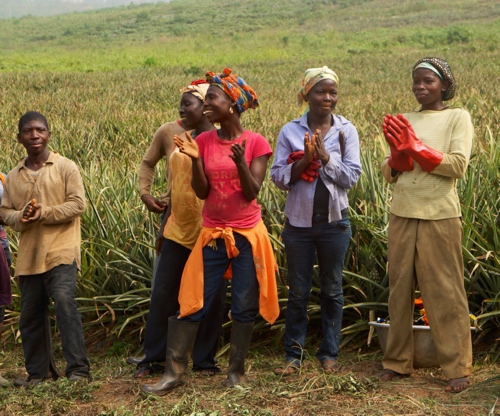
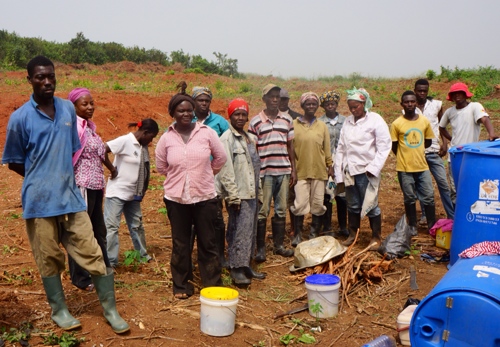
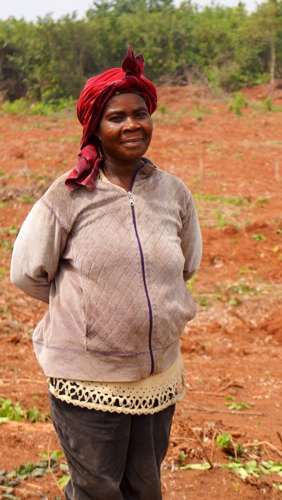
The overwhelming sense I’m left with is that it’s a hell of a long way from these fields to Whole Foods and that agriculture is definitely not for sissies. We hear all about the pitfalls that have befallen them in a short time. Too much rain. Too little rain. Fungus. Marketing difficulties and buyers falsely falsely claiming fruit delivered was bad. Many acres of plantings ruined by flooding caused by heavy rains. Plants maturing too quickly, requiring that they be sold locally (rather than overseas) at a low price. Timing of getting things to ships. Delays because of traffic. Delays in the packing house, causing them to miss a ship and therefor lose the crop (they’ve concluded that they need to build their own packing house, which will cost $500,000). Very hard work, planting, weeding and picking; long hours in the hot sun.
After a couple hours, we set off on the long drive (4 hours plus) to Kumasi, stopping for lunch at a very nice hotel/restaurant overlooking the sea, fanned continually by cool breezes. We complete the drive and arrive at The Four Villages Inn, our home in Kumasi, where Carol and I stay in the same room each time we come. We’re greeted by Frank, the son of the owners, Chris and Chastity, to whom we all express condolences at the very unexpected death of Chris in surgery in Canada less than a month ago. In less than half an hour, we’re settled into our rooms and are off to dinner at a Chinese Restaurant, with the Kwartengs and their two sons, Alex Eduful and several others. We’ll be spending tomorrow with Alex and his right hand man, Frank, visiting wells, so I’ll save the Eduful story for then.
January 6
Down for breakfast in the hotel.
Email from Sola. Once again, the best laid plans…so, unfortunately we will be unable to visit the home of a woman who is participating in the study Sola told us about last evening. So, I’ll tell you about it anyway, because it’s so interesting.
Sola is a pulmonologist who has a particular interest in indoor pollution, which he says kills over 4 million people annually, primarily women and young children, who suffer the effects of mothers cooking indoors without ventilation. He is conducting a fascinating study in Nigeria, designed to show the impact of indoor pollution on mothers and infants. He has enlisted 300 pregnant women, one-third of them are using new stoves he has provided that burn ethanol, a clean fuel. The others are equally divided between women cooking with wood and with kerosene, both of which are dirty fuels. Along with over twenty researchers he is supervising, they are conducting detailed tests at various stages of pregnancy on the fetus and the mother, and will continue with a longitudinal study that traces the subjects for five years after birth. The study is carefully designed to control for differences in nutrition, and other factors that could skew the results. Sola is justifiably excited about the study and the enormous impact it could have on saving lives.
The stoves are very inexpensive. The trick is to convince people to use them, and to assure that there’s a supply of ethanol. Sola, with his typical ingenuity, has convinced Shell Oil to donate the ethanol for his study and gotten Ibadan University to allow him to put a tank on their land. We’re sorry not to be able to see the stoves in action, but will look forward to hearing the results after the 2-year study is completed this August.
We meet the participants in an early morning meeting that Funmi is holding at our hotel, including the head of pharmacology at the University, a woman named Peace who we met a year and a half ago. Peace is collaborating with Purdue University on a project relating to assuring quality in African medicines. She is looking to build a lab, and the Kipharts will put her in touch with a foundation in Spain, who through the Kipharts, has constructed a lab at the clinic in Kumasi, Ghana that the Kipharts support. We’ve visited that maternal care clinic on all of our four trips to Ghana, and we’ll see it again in a few days. Ain’t globalization somethin’?
Not to air our dirty laundry, but we got into some rather spirited discussion with Funmi about the use/waste of our time on this trip. She apologized, but explained the reasons why not everything turns out as planned and we needed to be more patient. The air has been cleared, I think, but the incident shows that cultural differences surface, even among good friends. I later joked that I was going to entitle this post, “Fighting with Funmi.” She laughed, but it was clear that she would not have thought that very funny.
We set off with our security guard and Sammy, our protocol officer.
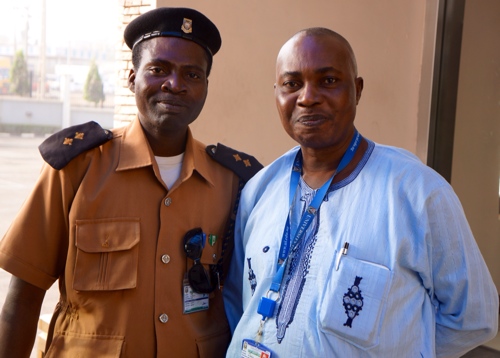
En route with Funmi we are able to discuss a range of topics, ask her about things that may have been unclear to us, and explore new topics. The slight bow/bend of the knee that we see frequently is a sign of respect from a younger person to an older person (regardless of gender; “age trumps gender,” Funmi says, and we applaud). The money passed out liberally at parties is part of the compensation for servers and performers (like tips) and a way of defraying the costs of the affair, when given to hosts. Funmi sees a sign of hope in the troubled Northeast. The newly elected emir was a former treasury secretary and an outspoken critic of corruption. In fact, he did a terrific TED talk. Anyone interested can email me and I’ll find it for you. He is effectively the king of Cano, the second largest city in Nigeria. A sign of the incredible connectedness of the Olopades is that recently they met the emir at a big birthday party, because he was and old school friend of Ayo’s (the groom) father.
We head to CRIN, Cocoa Research Institute of Nigeria, a government-funded institute that actually deals not only with cocoa, but also coffee, kola, cashew nuts, and tea. They do extensive research on all of these crops, seeking ways to improve them. The Kipharts have indicated some interest in possibly investing in cocoa and the Olopades, when they came in August (on the trip that we and the Kipharts were to have joined them on) did quite a bit to explore potential cocoa investment possibilities, particularly in Ekiti State, which we had visited in August, 2013.
The meeting with four CRIN scientists lasted about an hour during which they explained their operations and answered questions. Dick pretty clearly was not impressed with them as a possible investment partner. We then went out to the nursery to see the cocoa plants and the grafting process which has created hybrids that greatly out perform other varieties. Seeing is a good deal more fun than listening, especially when the difficulties of deciphering accents are compounded by the noise of construction outside.
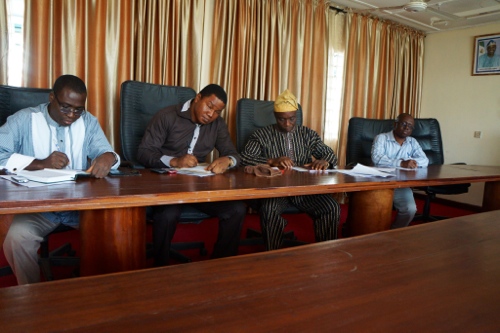
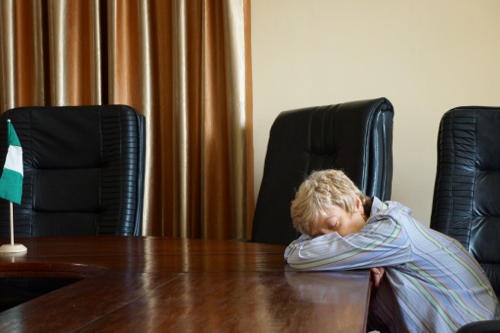
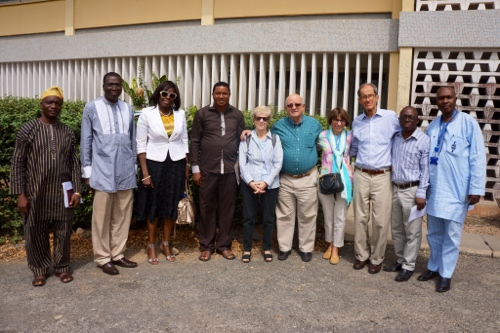 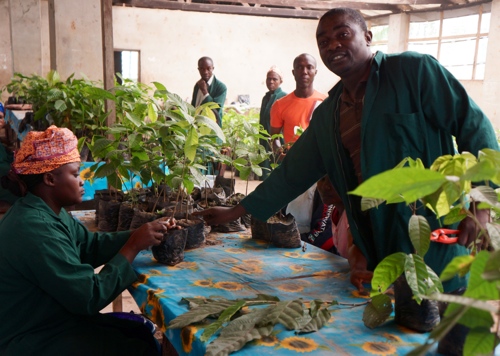
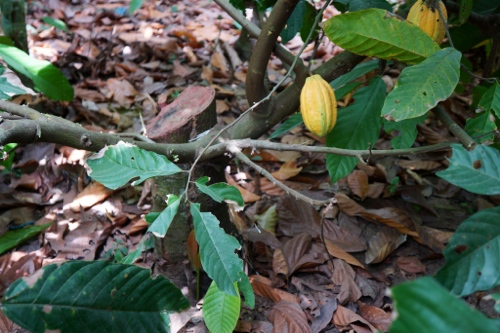
We headed out on the long, bumpy and dusty ride to the Lagos airport. For quite some time, there is heavy traffic, causing vehicles to form not one, but two, lines on the shoulder of the road jockeying for position both with other shoulder riders and with traffic on the main road, which vehicles enter and leave whenever there’s a perceived gain of a couple car lengths in doing so. The scenery on the side of the road is not uninteresting, composed of commercial areas, large gatherings of trucks and animals. Vendors risk their lives wandering in the midst of passing traffic, trying to sell drinks, food, gum and all manner of other things.


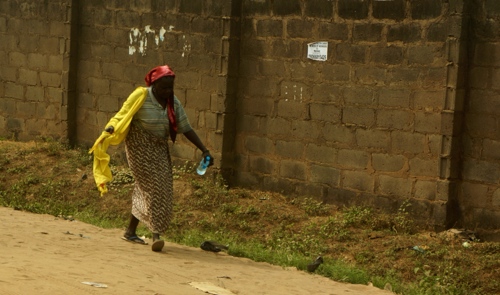

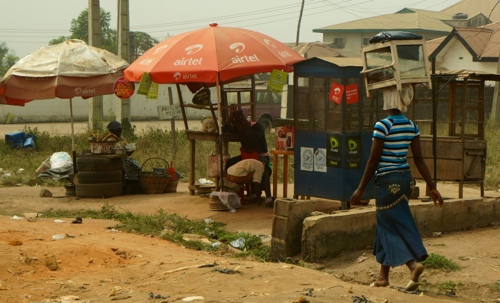
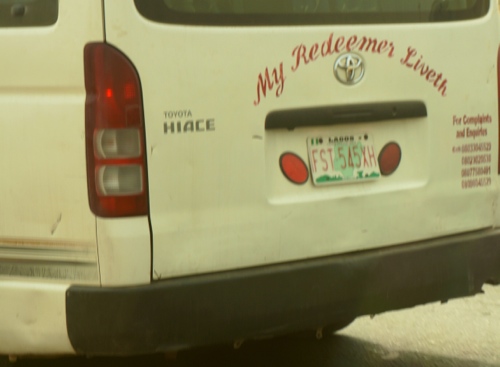
We reach the airport a bit over an hour before scheduled flight time and find the international terminal very uncrowded, as most international flights leave late in the evening. More to the point, the Olopades rule the Lagos airport, getting us quickly through baggage inspection, getting the check-in people to allow us extra bags without cost, convincing an inspector to allow Susie to take on a glass container that they had nixed, getting an airport employee to inform us in a lounge we occupy when the flight is ready and arranging for us to skirt the line at the gate. We have drinks and a snack in a new public lounge, then board the flight, which is about an hour and a half late.
The flight to Accra, the capital of a Ghana is less than an hour. We’re met at the airport by Daniel Kwarteng, the son of Joe (and Ida) Kwarteng, Dicks partner in the pineapple farm we will visit tomorrow. We’re greeted very warmly by Daniel, who we’ve met several times before. Going to Ghana is very much like coming home to us now.
We ride with Susie in a very comfortable car, driven by a young man named Sammy. Daniel drives Dick and the Olopades in a separate vehicle. We’ve decided to drive a couple hours tonight in order to be able to get an early start at the pineapple farm tomorrow and to be closer to Kumasi. En route, we pass a huge brand new shopping mall that opened a couple of months ago. I’m afraid to ask what stores populate it. At the same time, we see hundreds of young people walking the center line on the highway at night trying to hawk their wares, clearly at great risk to their lives.
Our two-hour drive takes three hours. The hotel appears perfectly fine, except that the wifi they have doesn’t work, so I won’t be able to post this blog or check emails. I was intending to have just a beer for dinner, but the buffet dinner which includes rice, vegetables in a nice sauce and prawns is good enough to go back for more. Joe Kwarteng is there with 8 or 10 of the people who work on the pineapple farm. The latter give an update on what’s going on there, but because of poor acoustics, generally bad hearing and Ghanaian accents, which differ from the Nigerian accents we’ve acclimated some to, I only get about half of it. Up to bed by 11.
January 5
Water pressure in the house makes showering impossible, so we’re planning to move to a hotel this evening. I probably could have survived without showers, but I draw the line at no wifi. I mean, c’mon. Susie says, “we could have done with this, if we had to, but, if you don’t have to…..” I told Susie that that pretty-much summed up my philosophy of life. I’ve never been one to skirt the moving walkways at airports.
We have breakfast at the house, eggs with a bit of a kick to them, fresh orange juice, toast and sausage, with Nescafé. We’re met at the house by the deputy vice chancellor of the university, EmilOlorun Aiyelari, who we are told we can call Ambrose (we Americans are so bad at making the effort to learn and pronounce foreign names), and taken over to the school, where we meet with 8 professors from all facets of the agriculture school– including forestry, agronomy, fisheries, wildlife, plant breeding and crop production, ecotourism, entomology–and see the work of a woman who is doing new research on cocoa plants. The Kipharts are reasonably knowledgable on some aspects of what we discuss. For Carol and me it is almost entirely a learning process (though each time we are exposed to it, we absorb a bit more). Those we meet with are obviously very experienced and expert in the areas we discuss. Their various different accents require close attention in order to absorb what is said, but the three hours we spend is quite interesting and rewarding. One common theme in all the agricultural areas is that for any work they do to be effective it needs to be built from the bottom up, paying close attention to what the farmer wants and is willing to do.
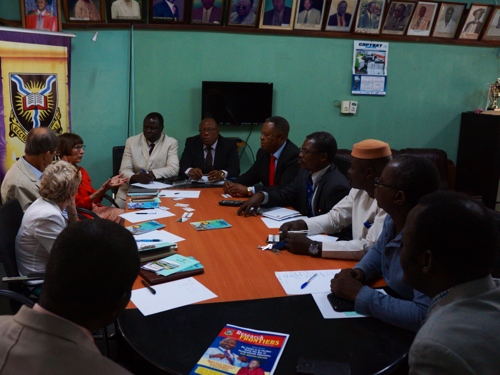
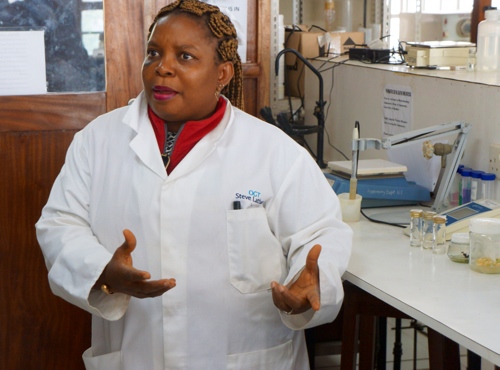
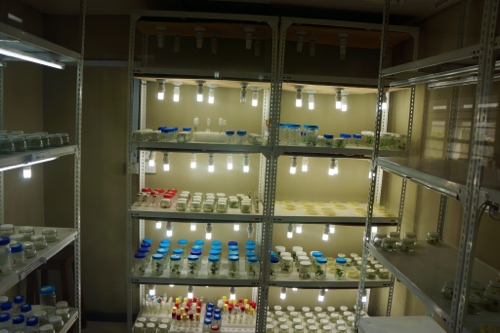
We returned to the house for a very good lunch, and assembled our luggage for transfer to the hotel. Wasted quite a bit of time, first driving to the University, then to the medical school to meet Funmi and finally back to the Unversity for a meeting with the Vice Chancellor, Isaac Adewole, who we had met a year ago August. Isaac is a powerhouse in his last year as Vice Chancellor and talked about what had and had not been accomplished under his tenure, and about an exciting project in solar energy that they plan to do with the government of Germany. Isaac has a clear vision for the university and is very bullish on both the University and Nigeria. He predicts that all of the troubles we read about in the Northeast with Boko Haram will die out within two years. He also thinks that the huge drops in oil prices will ultimately benefit Nigeria by forcing it to diversify and look to agriculture as one of its primary assets.
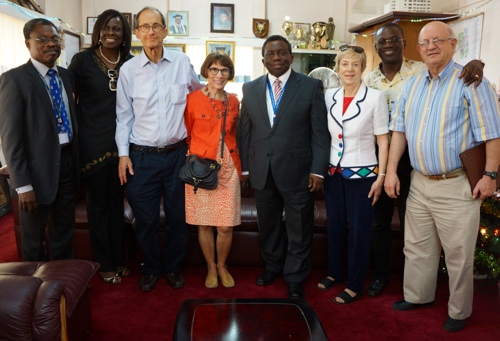
We drive to and check into the very nice, new Owu Crown Hotel, where the protocol officer who has accompanied us all along (“Samuel,” though that’s nothing close to his real name) negotiates a 30% discount because of our affiliation with the University, and we are given a suite. We barely have time to wash up, before we need to set out for dinner, hosted for us and about 25 university professors outside at the home of the Vice Chancellor. Driving there I realize that I’ve become so used to the African urban landscape that I barely notice what has fascinated me on prior trips and what I know first-time visitors would gawk at. I’ve included a few not very good photos, taken as we whizzed through in our van.
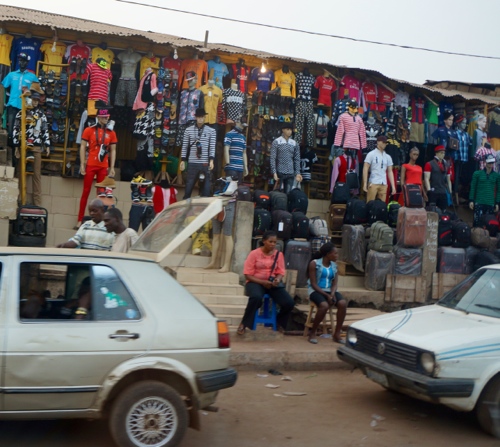
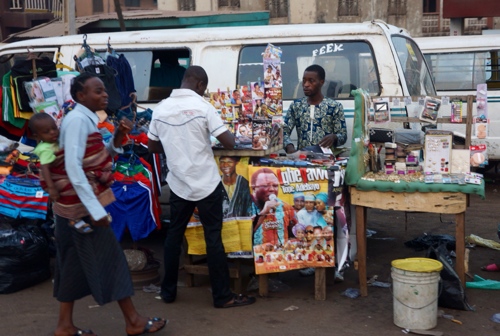
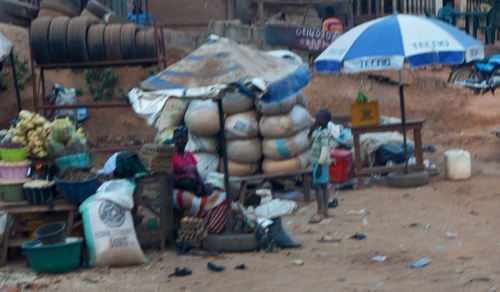
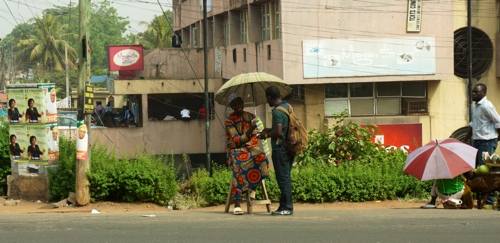
En route to the dinner, Sola tells us details of a fascinating study on indoor pollution that he is in the middle of. I’m going to hold the details until tomorrow, because it will fit better with what we are doing then. The dinner is quite pleasant, though I’d have enjoyed it even more if I had a richer appreciation for the nuances of poultry nutrition, the specialty of the Dean of the Agriculture School, who was seated next to me. We are showered with many gifts by the Vice Chancellor. Clearly, the VC feels that a relationship with the Kipharts is worth the very substantial amount of attention, time and effort that he and his faculty members have spent with us on our two trips. Another reason is undoubtedly the esteem in which two distinguished alumni of the University, Sola and Funmi, are held. Funmi does not attend the dinner, spending the evening instead with her 94-year old mother.
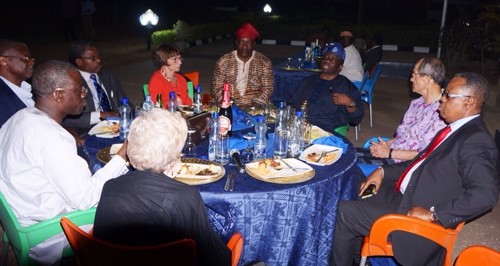
We drive back to the hotel, past night markets lit by kerosene lamps, and retire early.
January 4
Okay, I gotta start out with a shout-out to somebody who is not in Nigeria, but who is responsible for bringing Nigeria to you. The other day, I’d finished the post about the wedding/engagement, loaded pictures and the damn blog app crashed. Now how many of you think that made me happy? Right.
I think I made up several new Yoruban cuss words, before writing to Glenn Crocker, “my web guy,” who over the years has designed and modified my website, helped me with blog issues and, in short, done whatever I’ve needed. I’ll spare you all the details, but it was actually Glenn who posted the wedding/engagement post and, in half a dozen or more emails, guided me to a point where I can once again make posts. So, if you need any help with anything that smacks remotely of web-type stuff, get in touch with Glenn, and tell him that you discovered him in Nigeria. glenn@netmud.com, www.netmud.com
This may seem like a complete diversion from the description of the trip, but, actually, I don’t think it is. The blog has become for me a way of focusing on the events of the day and reflecting on them. In this sense, blogging enhances and becomes part of the trip. It also is a way of preserving those memories that is easier to access than the written journals I used to keep, and a good deal more visual. Finally, sharing our trip with friends and family who are interested also enriches and extends our travel experience and allows us to connect around those experiences with folks we care about.
Okay, now where the hell were we?
Up rather early to pack and have breakfast with the Kipharts. Then it was “get me to the church on time,” with Dick, Susie, Funmi and Sola to give thanksgiving for Feyi’s engagement. We were originally going to go to a larger, fancier church, which would have required the ladies to don their engagement headgear again, but since we have to get out of Dodge quickly (though Lagos, at over 18 million people, is quite a bit larger than Dodge), Funmi opted for a more modest church, which we plan to attend, dressed for the later events of the day (of which, more to come).
Well, actually, it turned out that our church was in the lobby of the Blowfish Hotel. We were mistakenly taken to the main cathedral, where we saw people dressed for church in finery equivalent to what we saw at the engagement. The young woman who accompanied us said everyone dressed up for Jesus, but she suspected that some dressed up for each other. We were later told by Funmi that the first Sunday of the year was a day on which people dressed in their absolute finest, to give thanks for having survived the year. As people leave the church, some pass out money (“tips”) to people standing outside. A fight nearly breaks out between young men shouting at one another, unhappy about the division of the spoils. Doling out money in this way appears to be a regular part of Nigerian celebrations, and occurred at the engagement party and later today at the birthday party. In any case, this cathedral was not where Funmi and Sola were going, so we headed back to the hotel to wait for Them. At least, back at the hotel, we got to see Feyi and Ayo, dressed for the service they were going to at the main cathedral. Oh, well, the best laid plans….
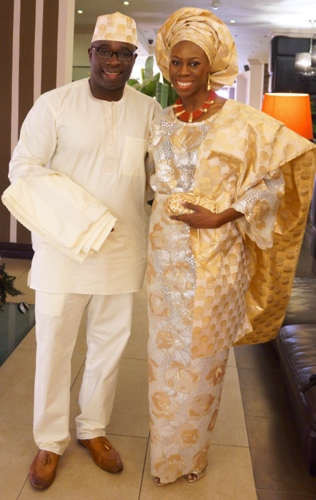
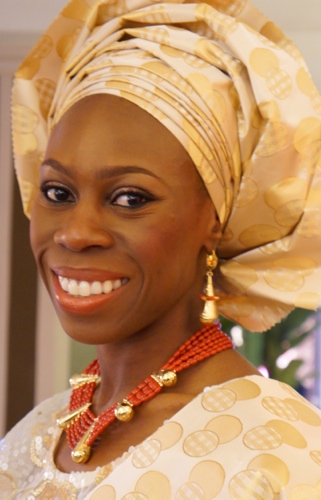
This morning, actually the entire few days we’ve been here, have been so different from the hectic pace we usually keep with the Kipharts and Olopades. Today will be another relatively slow-paced day, as we travel to Ibadan for the 70th birthday bash for Funmi’s brother, Abiodun Falusi, a professor of agricultural economics at Ibadan University. The 2-hour drive to Ibadan, a city of some 4 million people, is along a highway that is pretty decent, though in need of some repair. Driving is fast, weaving in and out, trucks are passed on the right or left. In shot, it’s smart to have strong religious convictions if you drive on these roads. We pass market areas and roadside retail spots, more urban than those we’ve typically seen in Ghana.
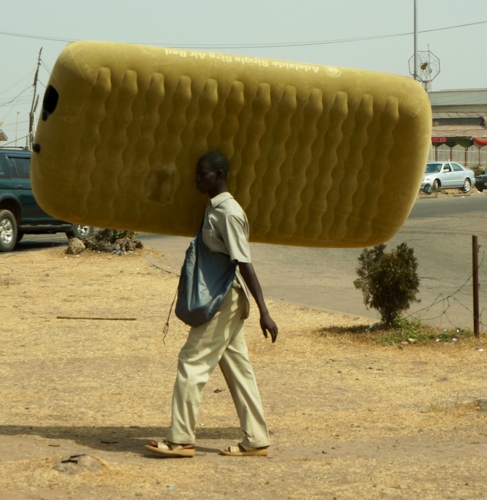
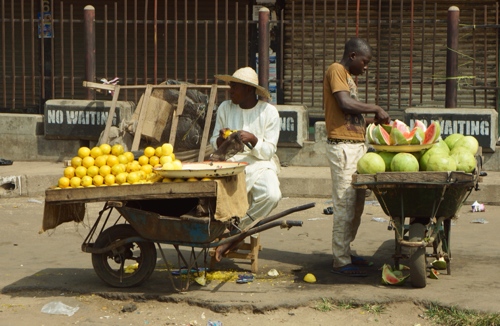
We travel with the Kipharts in a van with a driver, security guard and a representative from the university. The Olopades travel in a separate vehicle and trail us by probably close to an hour. We arrive at the university around 2PM, and are ushered into a very large auditorium, where probably 300-400 people dressed every bit as fancy as at the engagement party are seated at round tables of eight. Speeches are underway and, at a break, we are introduced from our table at the front of the hall.
This is a very major tribute to Funmi’s brother. A book has been prepared in his honor, with chapters written by many professors, for sale to those assembled. Guests are given bags with gifts of specially done diary books, notebooks, pens, all in Abiodun’s honor and with his name on it. Another book of his life history, with pictures and tributes is passed out.
Speeches continue for a very, very long time by professors, vice chancellors, friends and family. Abiodun’s family seems to rival the Olopades in terms of achievement. His wife is a doctor and expert on sickle cell anemia, at least two of his children are doctors, as well. Like the Olopades, they are a very handsome family.
While the affair goes on for a very, very long time (we’re there for over three hours), it’s warm and impressive. The strength of family and friendship bonds is palpable, the mood is festive. It’s nice to see a person’s life and work appreciated so fully at a time when he can enjoy the celebration, rather than at a funeral service, as frequently happens in the US. A large portrait of Abiodun is presented, and there is much thanks to and praise for Jesus. While the religiosity is over the top from my standpoint, it does lend a certain humility to the proceedings through recognition that a person’s accomplishments are not solely his own. There is talk of another party for Abiodun’s 80th, but I’m pretty sure I’m busy that day. Singing and dancing, with a live band, follow. These Nigerians know how to party. And we and the Kipharts are greeted very warmly by many people who we met on our trip to Nigeria last year, including Funmi’s 94-year old mother.
Here are some photos from the birthday bash:
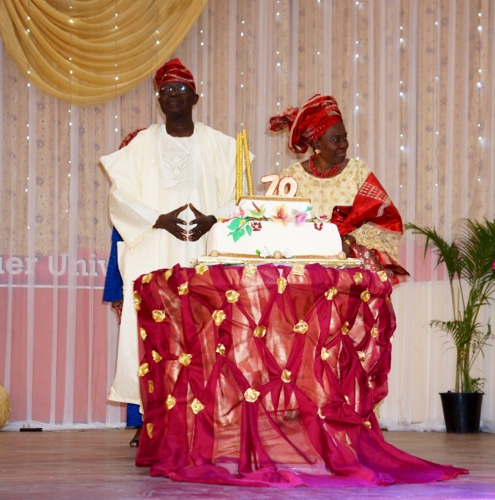
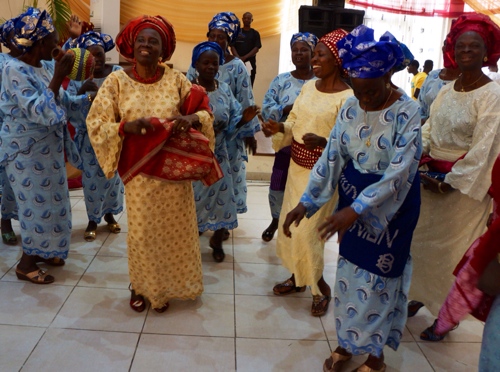
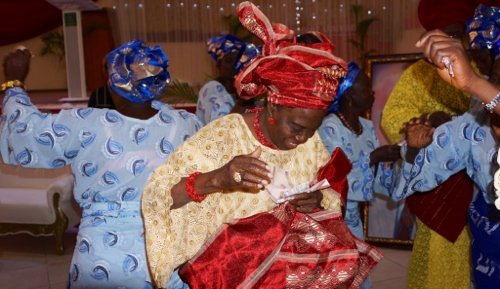
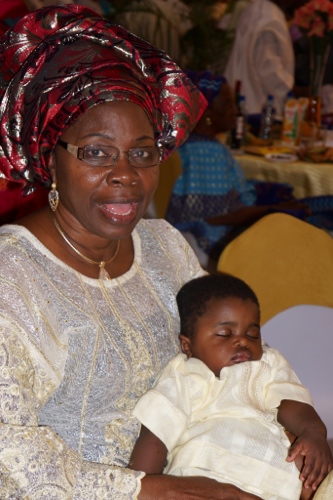 Young birthday celebrant with his Grandma 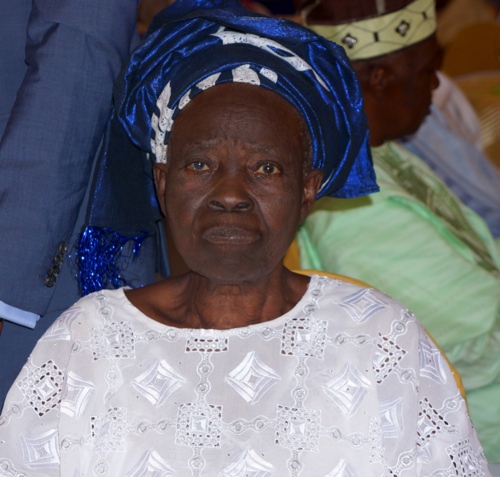 Funmi’s mom 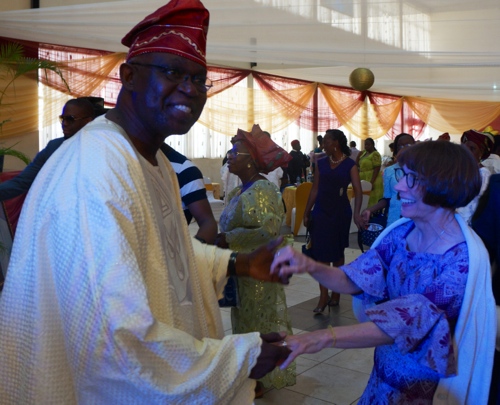 Abiodun and Susie 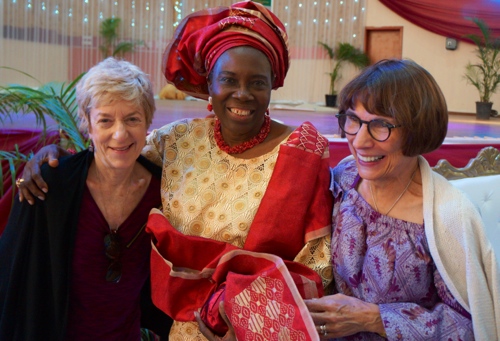 Abiodun’s wife with Carol and Susie As soon as the final prayer is offered and dancing begins, we say our goodbyes to the honoree and his wife, and arrange to meet the Olopades later. We are driven to a home on the Ibadan University campus, where we’ll stay for the next two nights. Our accommodations are fine, though far from posh. We spend some time reading, blogging, etc and around 7, are called to the dining room for a simple dinner. After dinner, Funmi comes over and we discuss the engagement and birthday parties, and the fact that we can’t get wifi in the house. Bummer, no blog post tonight. Retire very early, in need of a good night’s sleep
|
|




























































